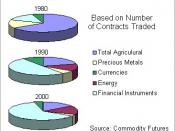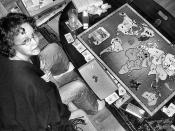WHAT ARE COMMODITIES/FUTURES
Today's Commodities include a much broader spectrum then the agricultural products that started it all and play a much larger role in the economy. A commodity is any item that is bought and sold on an exchange. Price is subject to supply and demand factors so risk is involved. Actually risk is what started the exchange trading of the basic agricultural products. A farmer who plants a crop, bread & feed livestock, risks the cost of producing a product ready for market at sometime in the future. Feedlot operators risk price price of metals, large corporations risk currency exchange rates on international contracts. Large Investment banks and brokerage houses have risk in inventories of bonds. Mutual funds have large positions in stocks. With futures trading on the exchanges this risk of future price can be offset to the speculator. The speculator, in effect, pays the farmer, the herder, or mine owner for the right to assume the risk.
Why, the speculator endeavors to make a profit. The value of trading in commodities is therefore tied in with the harvesting of crops, the marketing of industrial products, livestock and the related cost of storage. Inherent price risks are the primary reasons for the establishment of the futures contract.
DERIVATIVES
1. WHAT ARE DERIVATIVES
The usual textbook definition given for derivatives is something like, "instruments derived from securities or physical markets". Derivatives are usually contracts, not assets. So the action of shorting is merely that of sitting on one side of a contractual agreement that 9 times out of 10 will be settled with a mere cash exchange.
The most common types of derivatives that ordinary investors are likely to come across are futures, options, warrants and convertible bonds. Beyond this, the derivatives range is only limited by the...


